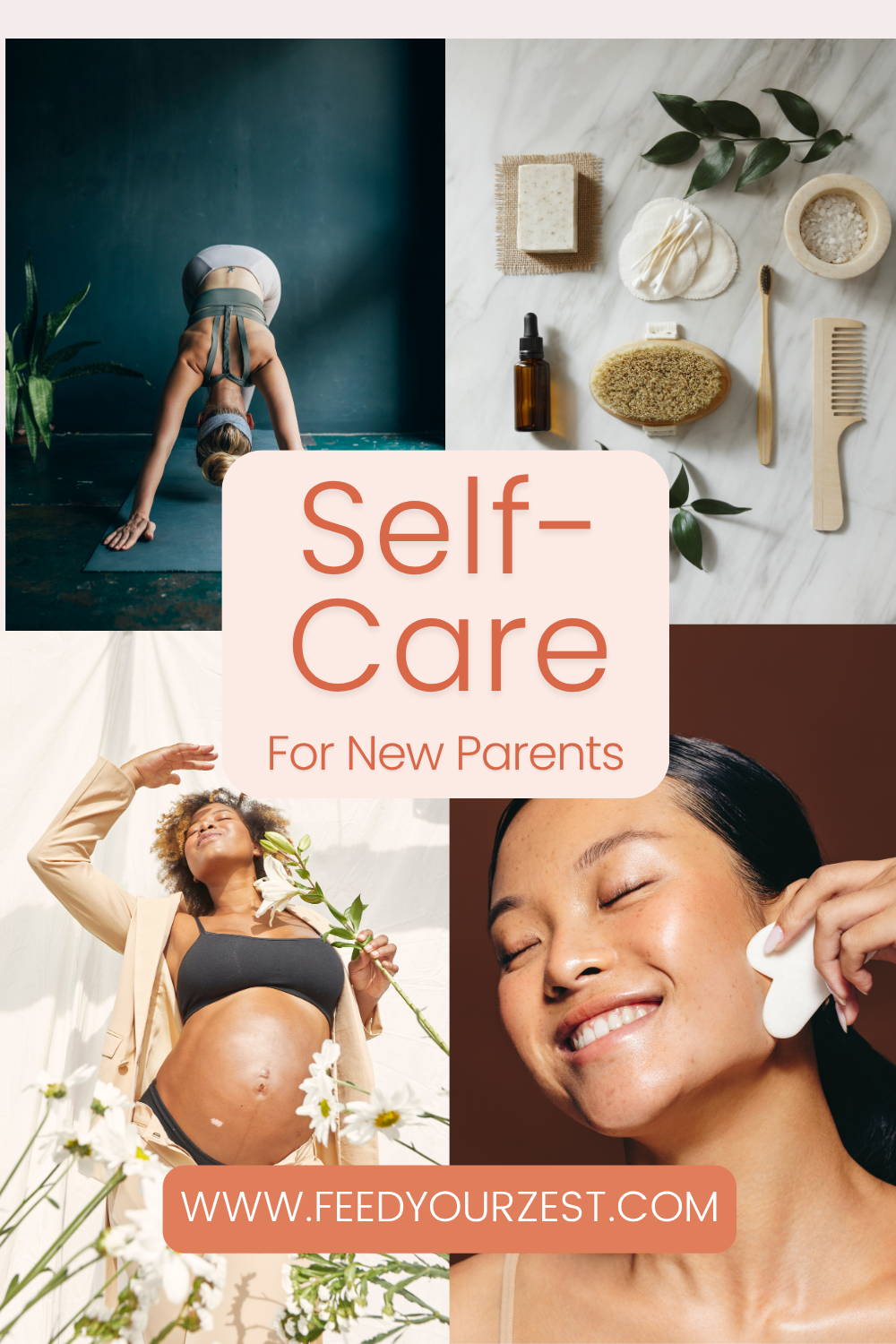5 Self-Care Tips for New Parents
By Gabriella Manwell, MPH - dietetic intern
Being a new parent brings a whirlwind of change. While this season can bring beauty and excitement, it often brings elements of challenge, such as shifting schedules, lack of sleep, fluctuating hormones, and more. As a loving and caring new parent, you may also have a duality of feelings, such as fun and excitement, but also lower energy and less focus on yourself as you care for the new life your body brought into the world. This is normal, and if you find yourself struggling with this duality of emotions, you are not alone! While caring for your new baby is a top priority, it’s just as important to care for yourself. You can’t pour from an empty cup, and showing up for yourself allows you to show up with more capacity for those you love.
Sometimes it can feel overwhelming and like you don’t have the energy to do everything all at once. The beauty is that you are not held to that standard of being perfect! Remind yourself, you can be an amazing mom and also human at the same time; these two things can coexist. Today, we’re going to touch on some habits that may help in this transition season of being a new parent, whether it’s for the first or 5th time. Each pregnancy and postpartum period can bring unique challenges. Remember, this is a guide to help you; not another to-do list. There is no pressure to implement all of these at once. Maybe pick one out of the list to implement and see how it helps you, and implement more as it seems fit. Remember to show yourself grace and compassion as you move through this transitional period.
5 Self-Care Practices for New Moms:
1. Supplementation
Postpartum can come with hormone fluctuations and possible nutrient deficiencies, especially when struggling to find the time and energy to eat a full, balanced meal. We recommend meeting with a registered dietitian to discuss what supplements you may specifically need, if any. Supplement needs are individualized and supplements are not regulated by the FDA, so working with a healthcare professional to test your specific nutrient levels and get recommendations for high-quality supplements (such as third-party tested supplements) can help to identify and support your individual needs.
In the postpartum period, nutrient deficiencies can be more common. many times, women experience deficiencies such as vitamin D, Iron, B12, omega-3, and more. At Feed Your Zest, we recommend continuing your prenatal supplement through breastfeeding or at least 3 months postpartum. Click here to get our prenatal vitamin guide, which includes brand recommendations!
2. Sleep
Sleep not only impacts our stress, mood, and hunger hormone levels, but it also impacts our brain and body’s ability to focus and recover emotionally as well as physically. As a new mom, quality sleep can be a big challenge. While this challenge is normal, there are a few strategies we can incorporate that can help mitigate this period. If you have a partner, don't be afraid to ask for support and take turns on “night shift” or completing daily duties/tasks. If your partner, friends, and/or family can help during the day, try taking a nap to recover as rest is also productive and helps you to show up better. Creating a calming and consistent nighttime routine, even if it's brief, can also help your brain associate your habits with sleep and promote better rest.
3. Ask for Help & Support
Sometimes we want to do it all and feel empowered by that, especially as a mother who might see selflessness as a measure of productivity. Remember that we all need help sometimes. Having the self-awareness that you need help is by no means weak. In fact, it takes courage and shows that you do care about yourself and those around you. Whether it’s hiring a nanny or a doula, or asking someone you trust to babysit, make meals, or clean the house, it is okay to ask for help. There are also support groups to talk with other women about similar experiences you may be going through. While our society often promotes the idea that we can do it all on our own, remember we weren’t meant to go through life alone, and you don’t have to. You are not expected to be everything to everyone.
4. Mental Health Therapy
With being a new mom can come pressures and unrealistic expectations we put on ourselves that can result in feeling overwhelmed or not good enough. Hormonal changes, relationship stressors, birth trauma, and more can also have big impacts on mental health in postpartum. It can be helpful to meet with a trained therapist to talk through these feelings or any other feelings you may have. One great place to find a perinatal mental health therapist is Postpartum Support International’s directory of certified professionals. Journaling your daily thoughts and feelings can also help relieve stress, anxiety, and the feeling of being overwhelmed.
5. Nourishing Your Body & Staying Hydrated
In the postpartum season, your body is at an increased demand for nutrients and hydration as it may be breastfeeding, pumping, healing, and going through big hormonal fluctuations. Having full, balanced meals with a mix of carbs, protein, and fat can help nourish and support your body in this season of increased demand. Making sure we are getting enough fiber, fruits, and vegetables can help provide vitamins and minerals to support our bodies.
Having quick, grab-and-go snacks can also be helpful to have around for those days when you feel limited on time or energy and need an energy boost in between meals. Get our free snack guide here. Again, don’t be afraid to ask for support. If you need help having meals prepped or having someone watch your little one while you enjoy a meal, there is no shame in that!
Hydration is also important. Keeping a water bottle by you and sipping on it consistently throughout the day can impact how you feel and your breast milk production if you are lactating. If you find that you are drinking multiple bottles but still feel thirsty, try adding an electrolyte powder, especially if you’ve been experiencing warm weather or are getting back into exercise.
While you navigate this new stage of life, remind yourself that you are still learning, growing, and doing your best, even if your best feels different in this season.
Take this transition period day by day, knowing you are enough, Each day may come with a different challenge or feel messy, but remember to give yourself grace. You’re not just caring for your baby, but you’re also becoming a new version of yourself. This can feel different and scary, but know you are growing, and be empowered by how far you have come and will continue to go.
Remember, as you go through these changes, it is okay to need extra care. If you're feeling overwhelmed or unsure where to start when it comes to nourishing yourself postpartum, you don’t have to figure it out alone. Working with a dietitian can help you to get personalized care and support in nourishing your body based on your specific needs and lifestyle.
We are always here to support you and your well-being. If you have questions about postpartum nutrition, apply for 1:1 nutrition coaching with our expert perinatal dietitians here. We can’t wait to hear from you!

